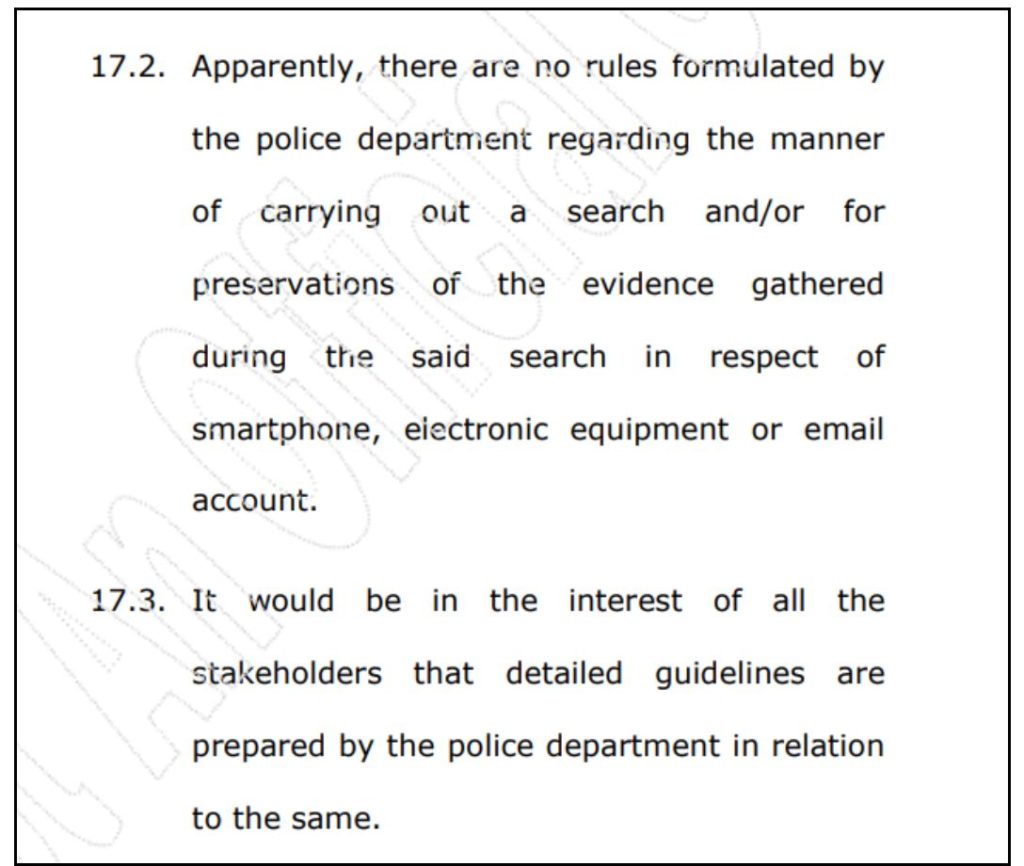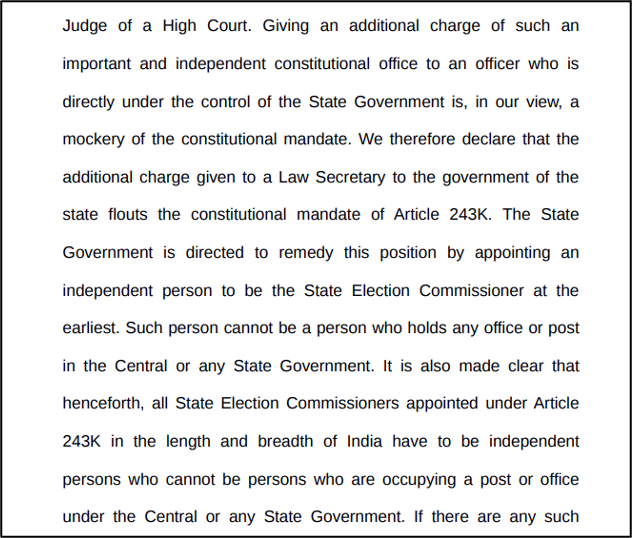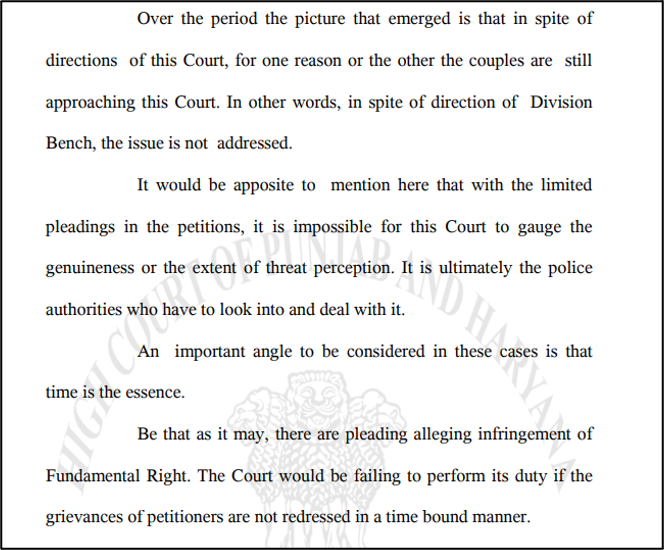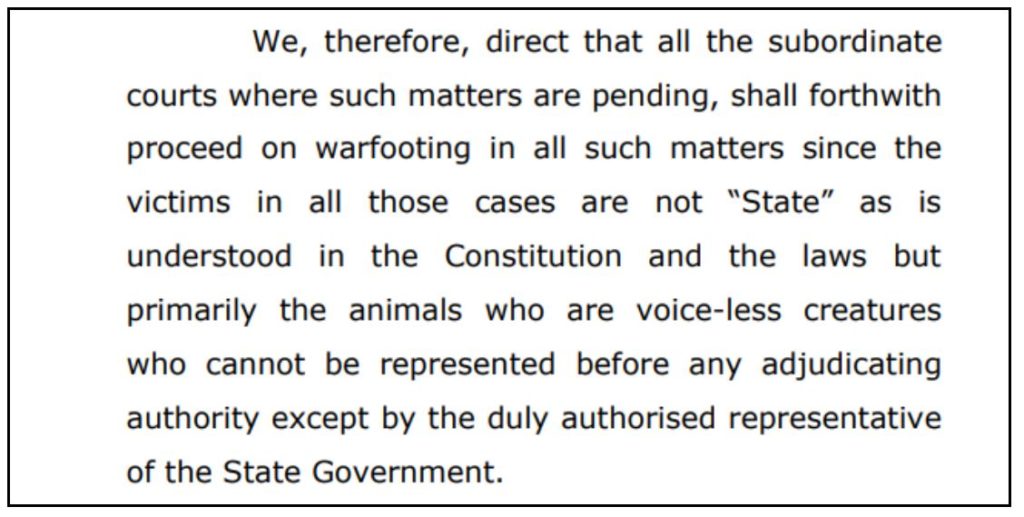In this roundup of the important court judgments, we look at directions about guidelines regarding the search of electronic devices, independence of State Election Commissioner, protection of inter-faith/inter-caste couples, and pendency under forest/animal law.
Karnataka HC: Issues guidelines for the search of computers, mobile phones, email accounts, electronic equipment, etc.
In the case Virendra Khanna vs. State of Karnataka and others, the high court underlined guidelines to be followed by investigating officers regarding the manner of carrying a search and/or for preservation of evidence gathered during an investigation that concerns smartphones, electronic equipment or email accounts.
The court was hearing a case where the investigation involved the search and seizure of an accused mobile phone. In this context, the judgement highlights that there is no specific law regarding the procedure to be followed during an investigation that involves electronic devices.
The judgement concludes that detailed guidelines must be prepared by the police department in relation to search and seizure of electronic devices. Meanwhile, until such instructions are formulated, the court issued a minimum set of rules to be followed in any such scenario.

The bench of Justice Suraj Govindaraj issued the followed guidelines:
In the case of a personal computer or a laptop;
- When carrying out a search of the premises, as regards any electronic equipment, Smartphone, or an e-mail account, the search team is to be accompanied by a qualified Forensic Examiner.
- At the time of the search, the place where the computer is stored or kept is to be photographed in such a manner that all the connections of wires including power, network, etc. are captured in such photographs.
- A diagram should be prepared to show the manner in which the computer and/or the laptop is connected.
- If the computer is powered on and the screen is blank, the mouse could be moved, and as and when the image appears on the screen, the photograph of the screen to be taken.
- The MAC address also to be identified and secured. In the unlikely event of the Forensic examiner not being available, then unplug the computer, pack the computer and the wires in separate faraday covers after labeling them.
Apart from the above steps regarding the seizure of the computer, laptop, etc., if the said equipment is connected to a network, the following was recommended:
- To ascertain as to whether the said equipment is connected to any remote storage devices or shared network drives, if so to seize the remote storage devices as also the shared network devices.
- To seize the wireless access points, routers, modems, and any equipment connected to such access points, routers, modems which may sometimes be hidden.
- To ascertain if any unsecured wireless network can be accessed from the location. If so, identify the same and secure the unsecured wireless devices since the accused might have used the unsecured wireless devices.
- To ascertain who is maintaining the network and to identify who is running the network – get all the details relating to the operations of the network and the role of the equipment to be seized from such network manager.
In case of mobile devices, the following was recommended:
- Mobile devices would mean and include smartphones, mobile phones, tablets GPS units, etc.
- Prevent the device from communicating to the network and/or receiving any wireless communication either through Wi-Fi or mobile data by packing the same in a faraday bag.
- Keep the device charged throughout, since if the battery drains out, the data available in the volatile memory could be lost.
- Look for slim-slots, remove the sim card so as to prevent any access to the mobile network, pack the sim card separately in a faraday bag.
- While conducting the search, if the investigating officer seized any electronic storage devices like CD, DVD, Blu-Ray, pen drive, external hard drive, USB thumb drives, solid-state drives, etc., located on the premises, label and pack them separately in a faraday bag.
- The computers, storage media, laptops, etc. to be kept away from magnets, radio transmitters, police radios, etc. since they could have an adverse impact on the data in the said devices.
- To carry out a search of the premises to obtain instructions manuals, documentation, etc., as also to ascertain if a password is written down somewhere since many a time person owning equipment would have written the password in a book, writing pad or the like at the said location.
- The entire process and procedure followed to be documented in writing from the time of the entry of the investigation/search team into the premises until they exit.
Supreme Court: State Election Commissioner must be a person who is independent of the State Government.
In the case State of Goa and another v Fouzia Imtiaz Shaik, the Supreme Court held that serving government employees cannot simultaneously function as State Election Commissioners.
In November 2020, the Governor of Goa appointed the Law Secretary of the Government of Goa, a member of the IAS, as State Election Commissioner in addition to his duties as Law Secretary. The court was hearing a batch of civil appeals that raise important questions on the provisions contained in Part IXA of the Constitution of India, which deals with Municipalities.
In the context of these appeals, the court held that the appointment of Law Secretary as State Election Commissioner was a subversion of the constitutional mandate contained in Article 243K of the Constitution, which says that the direction and control of all elections to the Panchayats shall be vested in a State Election Commission. The State Election Commissioner must be a person who is independent of the State Government as he is an important constitutional functionary who is to oversee the entire election process in the state, including panchayats and municipalities.
The bench of Justices RF Nariman, BR Gavai, and Hrishikesh Roy opined that giving an additional charge of such an important and independent constitutional office to an officer who is directly under the control of the State Government is a mockery of the constitutional mandate.

In conclusion, the Goa Government was directed to remedy this situation by immediately appointing an independent person who is not holding any office or post in the Central or State Government.
Punjab HC: Recommends steps for the protection of inter-caste/inter-faith couples/runaway couples.
In the case Lovepreet Kaur & Anr v. State of Punjab & Ors., the high court recommended steps for the protection of inter-caste/inter-faith couples/runaway couples to ensure the protection of life and personal liberty as guaranteed under Article 21 of the Constitution of India.
The court was hearing the plea of a married couple who solemnised marriage on 04 March 2021, against the wishes of their parents, and have been requesting protection. The court noted that a number of such protection petitions are being filed by the couples who marry against the wishes of their parents and relatives and the court is also being approached by couples in the case of live-in relationships.
A Single Bench of Justice Avneesh Jhingan held that genuine cases of threat are often overlooked amid a pile of cases that are filed on a daily basis.

The judgement states that it is impossible for the court to gauge the genuineness or the extent of threat perception and it is ultimately the police authorities who must look into and deal with it. However, the judgement suggested the following:
- Safe houses should be made available in each district of Punjab and Haryana, as well as in Union Territory, Chandigarh.
- A website or an on-line module should be provided for such couples to raise their grievances without being physically present.
- Providing of 24×7 help desk at Tehsil level for filing of such representations by aggrieved persons or through someone.
- An existing cell in the Police department can be deputed or a new cell can be created which can deal with the representation in a time-bound manner, in any case not beyond 48 hours.
- It can also be ensured by authorities that in case a request is made by the couples during the period of consideration of the representation, they are provided shelter in a safe house.
- The Legal Services Authorities can set up a 24×7 help desk for such couples with telephone service and internet connectivity at the local level.
The judgement highlighted that the entire endeavour of the exercise is that some sort of workable mechanism is put in motion to ensure the protection of life and personal liberty as guaranteed under Article 21 of the Constitution of India
In conclusion, the court ordered that in case a request is made by the petitioners, they may be provided shelter in a safe house till the next date. It also directed Advocate General(s) of both the States, Senior Standing Counsel for Union Territory, Chandigarh, and Member Secretaries to make a joint effort to give their inputs for dealing with the abovementioned mentioned issue.
Calcutta HC: Pending cases under forest/animal law in subordinate court should be addressed on war footing.
The high court on its own motion regarding smuggling and illegal trading of endangered species, held that all pending cases under forest/animal law in subordinate court should be addressed on war footing.
The High Court Administration placed on record a report which discloses the pendency of cases under different animal laws and forest laws. The court notes that there are 1140 cases pending under the forest laws.

The judgement highlights two important observations from the report:
- Though there is a legal cell in the department, they have a shortage of ground staff which is a great drawback in the proper management of adequate policing in the forest through the forest guards.
- There are clear cases of illicit activities and even illicit trade in animals including birds, reptiles, amphibians, fishes, etc.
Upon considering all the facts of the report, the bench of Chief Justice Thottathil B. Radhakrishnan and Justice Arijit Banerjee directed that all the subordinate courts where such matters are pending shall forthwith proceed on war-footing since the victims are voiceless creatures who cannot be represented before any adjudicating authority except by the duly authorised representative of the State Government. It also directed that the Registrar General will ensure that a circular following this order is issued within a week requiring all courts below to proceed with an action.
Further, the high court adjourned the matter to 26 March 2021, within which time a further affidavit is directed be filed by the conservator of forests disclosing the volume of illegal activities in trade or otherwise affecting the animal wealth and streamlining what could be suggested by the department.
Featured Image: Important court judgments


